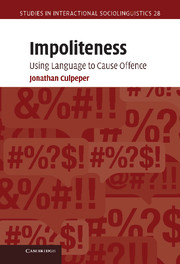Book contents
- Frontmatter
- Contents
- List of figures and tables
- Preface
- Introducing impoliteness
- 1 Understanding impoliteness I: Face and social norms
- 2 Understanding impoliteness II: Intentionality and emotions
- 3 Impoliteness metadiscourse
- 4 Conventionalised formulaic impoliteness and its intensification
- 5 Non-conventionalised impoliteness: Implicational impoliteness
- 6 Impoliteness events: Co-texts and contexts
- 7 Impoliteness events: Functions
- 8 Conclusions
- Notes
- References
- Index
Preface
Published online by Cambridge University Press: 16 May 2011
- Frontmatter
- Contents
- List of figures and tables
- Preface
- Introducing impoliteness
- 1 Understanding impoliteness I: Face and social norms
- 2 Understanding impoliteness II: Intentionality and emotions
- 3 Impoliteness metadiscourse
- 4 Conventionalised formulaic impoliteness and its intensification
- 5 Non-conventionalised impoliteness: Implicational impoliteness
- 6 Impoliteness events: Co-texts and contexts
- 7 Impoliteness events: Functions
- 8 Conclusions
- Notes
- References
- Index
Summary
Any research needs to justify its existence, because all research requires effort, time and money. Impoliteness is, in its modern incarnation, a new field of study, and any new field is prone to insecurity. More than this, impoliteness is up against prejudice. Embarrassed silence is a typical reaction when I declare what my research is, followed by a rapid change of topic. This is not quite the reaction one gets having declared one's research to be Shakespeare or the syntax of world languages. Impoliteness is assumed to be an unfortunate behavioural aberration, and, as far as language is concerned, it is the nasty scum on the margins. To be fair, this is not so often the reaction of people with more social interests. Impoliteness is, in fact, of great social importance. It is salient in the consciousness of the general public. In the guise of ‘verbal abuse’, ‘threats’, ‘bullying’ and so on, it is referred to and prohibited by public signs, charters, laws and documents relating to public places (especially in England); it is addressed by government (cf. Tony Blair's Respect Agenda); it is often reported in the media, particularly when it occurs in contexts where it seems ‘abnormal’ (e.g. verbal abuse directed at the elderly); and beamed into our living rooms usually as entertainment, as in the case of exploitative TV chat, quiz and talent shows (e.g. Britain's Got Talent).
- Type
- Chapter
- Information
- ImpolitenessUsing Language to Cause Offence, pp. xii - xivPublisher: Cambridge University PressPrint publication year: 2011

